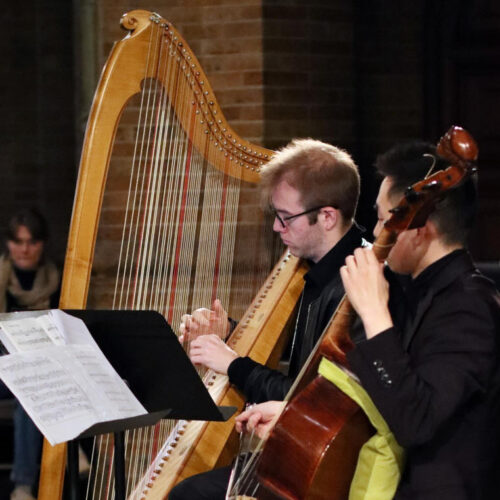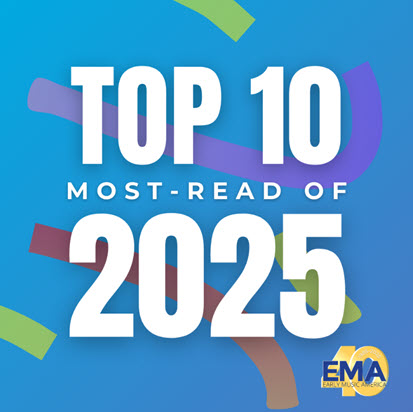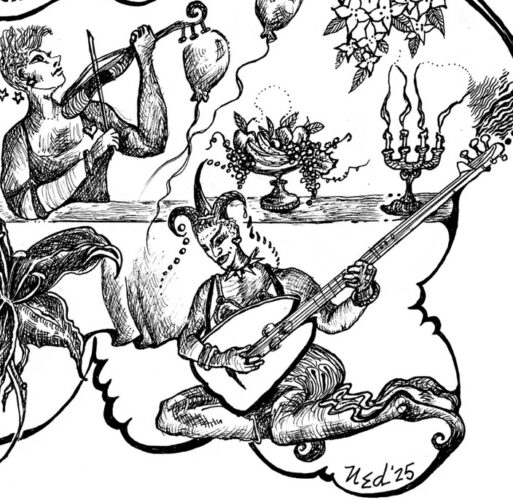by Kyle MacMillan
Published September 9, 2024
First-time artistic directors Priscilla Herreid and Liza Malamut are bringing a fresh perspective to esteemed ensembles
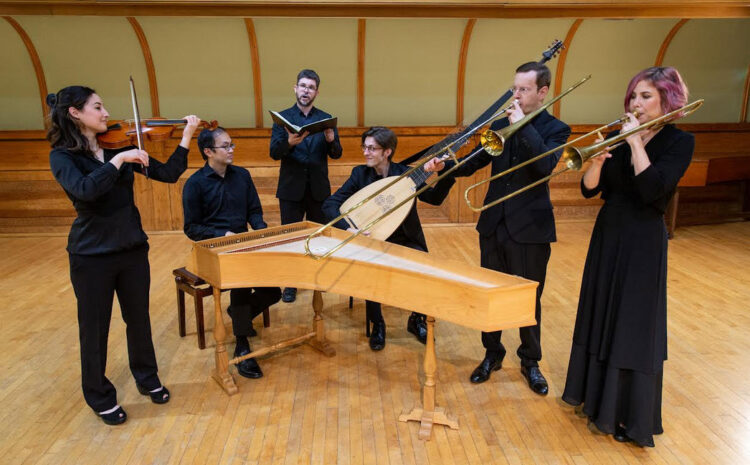
When Liza Malamut, a nationally admired sackbut player and scholar, took charge of the Newberry Consort as artistic director in 2022, she was careful not to depart too far from the traditions of the research-inspired Chicago ensemble. But that didn’t mean she couldn’t experiment a little more, rethink old habits, test imaginative initiatives.
In February, for example, she set up a day of open auditions and informal meetings for any early musician living within a 60-mile Chicagoland radius. They also accepted online submissions. The notice read:
Interested artists should prepare two selections to be sung in a historical style or performed on period instruments. The two selections should be in contrasting styles and represent two of the following time periods: medieval, Renaissance, early 17th century, high Baroque (loosely composed before the end of the 17th century). Artists should use the appropriate pitch and temperament for their prepared repertoire. The Consort will provide an accompanist…
As a newcomer to the Chicago scene, Malamut — an Eastman grad, a doctorate from Boston University, teaching historical trombone at Indiana University — wanted to become better acquainted with the region’s players. “You never know who might come out of the woodwork,” she said, and “who is really interested to perform early music or learn about early music.”
Indeed, first-rate musicians did show up. Some of them were invited to take part in the Newberry’s 2024-25 season, which opens Oct. 18 with a program called I Tremble Not: Music from Jacobean England.
Among the local discoveries was Laura Osterlund, a recorder player who will be included on the group’s madrigal concert in Feb. 2025. “She walked into that room,” the Malamut said, “and played absolutely fabulous recorder solos — and she lives right in Chicago. I’m super excited to work with her.” Malamut was distantly aware of Osterlund, but the two hadn’t crossed paths in almost a decade.
Founded in 1980, the Newberry Consort had been led, since 2009, by the husband-and-wife, co-artistic director team of David Douglass and soprano Ellen Hargis. At 40, Malamut is one of a new generation of leaders who were too young to experience the heady rush of the early-music pioneers — that 1960s through ’80s generation who were figuring out how to play forgotten historical instruments, uncovering manuscripts and treatises in far-flung archives, and battling a mainstream classical world opposed to their novel historical approach. Some of today’s highest profile, still-new-on-the-job leaders include Bill Barclay at New York’s Music Before 1800, Julian Perkins at the Portland Baroque Orchestra, the duo of Jos van Vedhoven and Craig Hella Johnson at the Oregon Bach Festival, and Jonathan Cohen at Boston’s venerable Handel and Haydn Society.
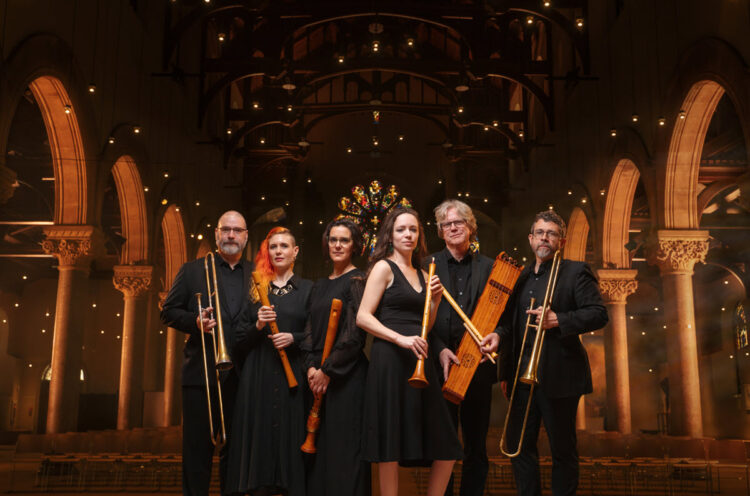
By their attitudes and fresh artistic planning, this cohort of leaders seems to share the belief that there are plenty of discoveries to be made, innovative programs to be dreamed up, and new audiences to entice.
Malamut is especially thrilled about the recent attention in the early-music world to the Middle East, Asia, and other parts the world. “That’s why I got into early music,” she said, “because there is always a new rabbit hole to go down, new things to discover, new ways to think about the music. In that sense, I think the excitement is still there.”
Another new leader in the field is Priscilla Herreid, 38, who also began her duties in 2022 as artistic director of Philadelphia’s Piffaro, The Renaissance Band, replacing Bob Wiemken and Joan Kimball, who founded the group in 1980. Piffaro’s 2024-25 season opens Oct. 11 with Triomphi, music inspired by the poetry of Petrarch. The concert includes TENET Vocal Artists, with projections by the celebrated visual artist Camilla Tassi.
‘A risk for everybody’
In addition to replacing longtime, highly respected stalwarts, both Harried and Malamut are first-time artistic directors. The organizations clearly wanted their fresh — you’re tempted to say youthful — perspective. Indeed, Newberry’s board even urged Malamut to continue performing outside the organization so she could be constantly exposed to new ideas.
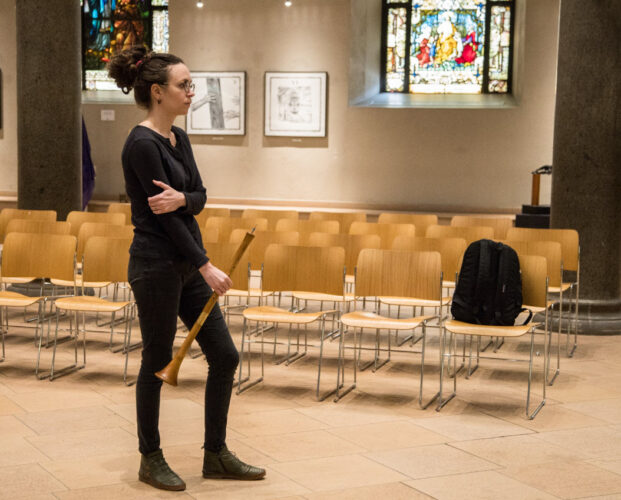
Even though Herreid had performed with Piffaro since 2008, she had been a freelance musician her whole career, having earned a master’s degree in the inaugural class in Juilliard’s Historical Performance program. She admits she knew little about fundraising, programming, and related matters essential to being an artistic director. “It was a risk for everybody,” she said. “They didn’t know how I was going to do. I didn’t know how I was going to do.” To help her, she was named artistic director-designate for the 2021-22 season and shadowed the group’s executive director before formally beginning her tenure.
Both leaders have brought an open attitude to their respective ensembles, but they have taken similarly gradual, incremental approaches to change. Some of the most obvious places where that transformation is evident is in programming. “My voice, if you will, is coming out,” said Herreid, “and I’ve been playing around with sounds, colors, and combinations of things that we haven’t done so much in Piffaro.”
As an example, she pointed to the group’s final program of 2023-24, titled Glory of the Wind Band: Music from Portugal and Spain. “That really felt like a me program,” Herreid said. Spanish and Portuguese wind players were some of the most important in Europe, and she set out to highlight some of the best from the 16th and 17th centuries, those well-known and not so well known, creating sets of four or five works grouped by period and city. Among the composers featured were Francisco Guerrero, João Leite de Azevedo, Duarte Lobo and Diego Pisador. It required considerable detective work, with some of the music having to be transcribed from original manuscripts.
Piffaro’s past programs were organized with emphasis on structure, where each set had an “inner plot” or musical arc, tying it into the whole concert. Herreid continues to hone that approach, while creating programs that are both “academically interesting” and musically satisfying. “You still have to find music that sparkles, that goes from one piece to the next without letting the energy down,” she said.
The Newberry Consort has always been known for its eclectic mix of programming, and Malamut has sought to expand that scope while not altering the group’s basic mission. One of her favorite programs in the group’s 2023-24 season was a fall offering featuring music by the almost-unknown Sophie Elisabeth, a 17th-century German duchess, composer, poet, and patron of the arts. “Her music has never been recorded,” Malamut said. “It’s hardly ever played, and a lot of program construction involved transcription from manuscript sources. And it was a bit of a risk, too, because I was worried I wouldn’t like how the music sounded once it was played, because it’s never been played before. I was really happy with how it turned out.”
Where’s my audience?
One of the biggest challenges facing both Piffaro and Newberry is re-gaining the audiences lost during pandemic shutdowns. While people are willing to go to concerts for Piffaro’s series in Wilmington, Del. and its neighborhood venues in Philly, its main downtown concert home — the Philadelphia Episcopal Cathedral — remains a tough sell.
It’s a similar story for Newberry. A perception of crime and a general reluctance among some attendees to travel to downtown Chicago has dampened attendance in Roosevelt University’s Ganz Hall. In an effort to counter that trend, the group has experimented with more afternoon concerts. “I think sometimes people are more comfortable when they don’t have to travel in the evening,” Malamut offered.
One solution for Piffaro has been to continue the high-quality, digital streaming of their concerts that they began during the pandemic. In addition to the small fees they earn from such on-line views, many of these virtual viewers also add a supplementary donation. “We have all these people watching who have loved Piffaro for years but who don’t get to see us [live],” Herreid said.
Another challenge for these established ensembles is the ever-increasing proliferation of new or expanding groups. In Chicago, for example, the Haymarket Opera Company began presenting fully staged, historically informed productions in 2011, including hand-painted set designs. Apollo’s Fire, an internationally known ensemble based in Cleveland, has added an annual Chicago series and is building an Illinois infrastructure, including staff and a board of directors, to make the Windy City a proper second home. But Malamut doesn’t think such competition has to be a threat if handled properly.
“When that happens,” she said, referring to new and outside ensembles calling Chicago home, “collaboration is key. If early-music groups in the same town work together, either to produce concerts together or to promote each other, we can help to increase our audiences vs. cannibalize the audiences.” And that is she what has tried to do by reaching out to her fellow leaders across the city.
‘We are coming into a brand-new situation socially, economically, and politically’
For Herreid, Malamut, and other new leaders in the early-music world, there is no going back to pioneering days of the movement. Early music is a firmly accepted part of the classical world in 2024, players are better trained and more technically proficient, and music that was moldering on library shelves can often be easily accessed on the internet.
And if all that isn’t enough, the larger world is very different than it was in the final decades of the 20th century. “In a lot of ways,” Malamut said, “we are coming into a brand-new situation socially, economically, and politically which really affects how I think about doing things, whether it’s programming or just the way we think about concert-going.”
But with change comes possibilities, and Herreid and Malamut believe there are plenty of opportunities for greater diversity, further discoveries and musical growth. “That’s what’s exciting,” Herreid said, “finding ways to make this music come alive in this 21st-century setting.”
Kyle MacMillan served as the classical music critic for the Denver Post from 2000 through 2011. He is now a freelance journalist in Chicago, contributing regularly to the Chicago Sun-Times and writing for national publications and websites including Chamber Music Magazine and Classical Voice of North America.

